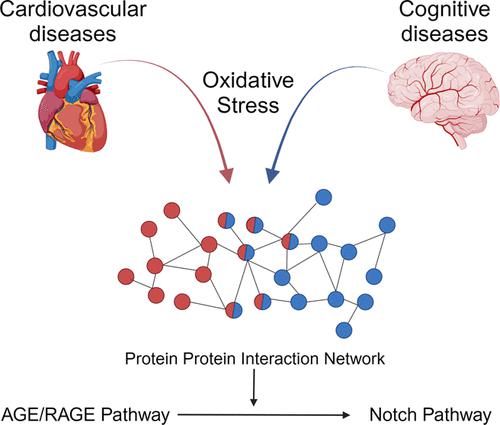当前位置:
X-MOL 学术
›
J. Proteome Res.
›
论文详情
Our official English website, www.x-mol.net, welcomes your
feedback! (Note: you will need to create a separate account there.)
Shared Proteins and Pathways of Cardiovascular and Cognitive Diseases: Relation to Vascular Cognitive Impairment
Journal of Proteome Research ( IF 3.8 ) Pub Date : 2024-01-22 , DOI: 10.1021/acs.jproteome.3c00289 Melisa E Zeylan 1 , Simge Senyuz 1 , Pol Picón-Pagès 2 , Anna García-Elías 2 , Marta Tajes 2 , Francisco J Muñoz 2 , Baldomero Oliva 3 , Jordi Garcia-Ojalvo 4 , Eduard Barbu 5 , Raul Vicente 5 , Stanley Nattel 6 , Angel Ois 7 , Albert Puig-Pijoan 7 , Ozlem Keskin 8 , Attila Gursoy 9
Journal of Proteome Research ( IF 3.8 ) Pub Date : 2024-01-22 , DOI: 10.1021/acs.jproteome.3c00289 Melisa E Zeylan 1 , Simge Senyuz 1 , Pol Picón-Pagès 2 , Anna García-Elías 2 , Marta Tajes 2 , Francisco J Muñoz 2 , Baldomero Oliva 3 , Jordi Garcia-Ojalvo 4 , Eduard Barbu 5 , Raul Vicente 5 , Stanley Nattel 6 , Angel Ois 7 , Albert Puig-Pijoan 7 , Ozlem Keskin 8 , Attila Gursoy 9
Affiliation

|
One of the primary goals of systems medicine is the detection of putative proteins and pathways involved in disease progression and pathological phenotypes. Vascular cognitive impairment (VCI) is a heterogeneous condition manifesting as cognitive impairment resulting from vascular factors. The precise mechanisms underlying this relationship remain unclear, which poses challenges for experimental research. Here, we applied computational approaches like systems biology to unveil and select relevant proteins and pathways related to VCI by studying the crosstalk between cardiovascular and cognitive diseases. In addition, we specifically included signals related to oxidative stress, a common etiologic factor tightly linked to aging, a major determinant of VCI. Our results show that pathways associated with oxidative stress are quite relevant, as most of the prioritized vascular cognitive genes and proteins were enriched in these pathways. Our analysis provided a short list of proteins that could be contributing to VCI: DOLK, TSC1, ATP1A1, MAPK14, YWHAZ, CREB3, HSPB1, PRDX6, and LMNA. Moreover, our experimental results suggest a high implication of glycative stress, generating oxidative processes and post-translational protein modifications through advanced glycation end-products (AGEs). We propose that these products interact with their specific receptors (RAGE) and Notch signaling to contribute to the etiology of VCI.
中文翻译:

心血管和认知疾病的共享蛋白质和通路:与血管性认知障碍的关系
系统医学的主要目标之一是检测与疾病进展和病理表型有关的推定蛋白质和通路。血管性认知障碍 (VCI) 是一种异质性疾病,表现为由血管因素引起的认知障碍。这种关系背后的确切机制尚不清楚,这给实验研究带来了挑战。在这里,我们应用系统生物学等计算方法,通过研究心血管和认知疾病之间的串扰来揭示和选择与 VCI 相关的相关蛋白质和通路。此外,我们还特别包括了与氧化应激相关的信号,氧化应激是一种与衰老密切相关的常见病因学因素,是 VCI 的主要决定因素。我们的结果表明,与氧化应激相关的途径非常相关,因为大多数优先的血管认知基因和蛋白质都在这些途径中富集。我们的分析提供了可能导致 VCI 的蛋白质的简短列表:DOLK、TSC1、ATP1A1、MAPK14、YWHAZ、CREB3、HSPB1、PRDX6 和 LMNA。此外,我们的实验结果表明,糖化应激具有很高的意义,通过晚期糖基化终产物 (AGEs) 产生氧化过程和翻译后蛋白质修饰。我们建议这些产品与其特异性受体 (RAGE) 和 Notch 信号相互作用,以促进 VCI 的病因。
更新日期:2024-01-22
中文翻译:

心血管和认知疾病的共享蛋白质和通路:与血管性认知障碍的关系
系统医学的主要目标之一是检测与疾病进展和病理表型有关的推定蛋白质和通路。血管性认知障碍 (VCI) 是一种异质性疾病,表现为由血管因素引起的认知障碍。这种关系背后的确切机制尚不清楚,这给实验研究带来了挑战。在这里,我们应用系统生物学等计算方法,通过研究心血管和认知疾病之间的串扰来揭示和选择与 VCI 相关的相关蛋白质和通路。此外,我们还特别包括了与氧化应激相关的信号,氧化应激是一种与衰老密切相关的常见病因学因素,是 VCI 的主要决定因素。我们的结果表明,与氧化应激相关的途径非常相关,因为大多数优先的血管认知基因和蛋白质都在这些途径中富集。我们的分析提供了可能导致 VCI 的蛋白质的简短列表:DOLK、TSC1、ATP1A1、MAPK14、YWHAZ、CREB3、HSPB1、PRDX6 和 LMNA。此外,我们的实验结果表明,糖化应激具有很高的意义,通过晚期糖基化终产物 (AGEs) 产生氧化过程和翻译后蛋白质修饰。我们建议这些产品与其特异性受体 (RAGE) 和 Notch 信号相互作用,以促进 VCI 的病因。

































 京公网安备 11010802027423号
京公网安备 11010802027423号